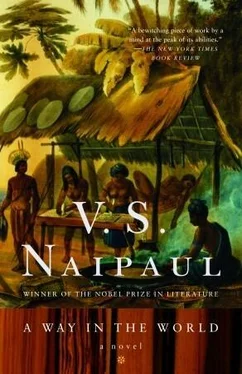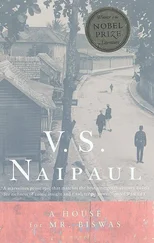“You had a bad time in Trinidad. I know. I talked to people. It could have ended for you there. People in that little place were so full of their own hatreds they hardly had time for you. If you had stayed for another year or so you might have lost the few protectors you did have. The amazing thing is that, having had the luck to get away, you so quickly decided to risk it all again and come back. I don’t know what Bolívar told you about the state of the country. I don’t think he could have told you that the royalists held both the east and the west.”
“He seemed to be using my own words. He made me feel that what I had been prophesying had come true. The trouble I had, to get permission to leave England! It was almost as hard as leaving Venezuela the first time. It was much harder than leaving Trinidad. The ministers didn’t want it. They didn’t want their Spanish allies in Cadiz to think that they were encouraging the break-up of the Spanish empire. In the end we compromised. I would leave England on a warship and they somehow wouldn’t notice. But they insisted that for appearances’ sake Bolívar and I should travel on different ships. So Bolívar went ahead with my papers. I tell you this so you would understand I had complete faith in him and his family. I had had my papers beautifully bound the previous year by Dulau. Sixty-three volumes in three new boxes, with a brass plate with my initials on each box.”
“If you had known that at the end the whole country was going to be against you, would you have come out?”
“After thirty years I couldn’t have stayed away. I had to see it through to the end. Even to that moment you talk about. I had to see all my ideas turned inside out, as it were. That became a kind of release, in fact, right at the end. For years I used to tell people that if I could be set down on the Venezuelan coast with two hundred men, or fewer, the whole country would come over to my flag of liberty. It didn’t happen like that to me. It happened to the other man, the rough naval officer the royalist authorities sent against me. He was blessed with luck. He landed with a hundred and twenty sailors and everybody began to go over to him. In twelve weeks he overwhelmed us. He could do nothing wrong. The Indians went over to him. The mulattoes, the pardos, the dark people, were with him. The mulattoes fought like demons at Valencia. Even when the white people surrendered they fought on. I had five thousand men. The mulattoes fought on even when there were only five hundred of them. For them, as you say, the question of the revolution was: ‘Who is going to rule over us?’ And they simply didn’t want to be ruled by the people on my side. I had to make two assaults on Valencia. Eight hundred people were killed in that little siege, and fifteen hundred people were wounded. I remembered, too late, what Hislop had told me about the free people of colour on the other side of the Gulf — and I had never begun to think that that might have anything to do with me.
“I thought later, when things became hard, that I should enrol Negroes in my army. I offered them freedom if they served for ten years. I don’t know what Wilberforce would have thought of that — this was just a year after our meetings in London. But at this stage everything I did was going to be wrong. The offer to enrol Negroes didn’t get me suitable soldiers, and it turned everybody else against me. The royalists at Curiepe in revenge turned the Negroes from their plantations on me. They sent them marching to Caracas to loot and burn the place down.
“This was the end. I was quite encircled. After Bolívar lost Puerto Cabello we were absolutely without resources. People were leaving me every day. I could depend on no one. I couldn’t carry on the war. At the beginning people like Roscio wanted me to keep out of their revolution. Now they left me alone with it. Everybody focussed his resentment or fear or hate on me — republican, royalist, all the four colours. I saw then what you have said, that the war was unwinnable, that if somehow the revolution could be reconstituted and we could go back to the beginning, it would all unravel again, and in almost the same way. I realized in those last days that for all those years abroad I had been speaking only for myself, that the revolution I had been working for would have come about only if all Venezuelans were like me, coming from a family like mine, and having a career like mine. It was what the Spaniards had always said, that my revolution was a personal enterprise.
“The knowledge was a kind of release. I wouldn’t have arrived at it if I had stayed in London or if I had left the war half-way through. I would have been nagged by the feeling that there might have been something I could have done, that in spite of the four colours and the marquises of cocoa and tobacco and everything else I had always known about Venezuela, the ideas I had worked out might have proved right. Perhaps the philosophers were right. Perhaps below all the accidental things about people — birth, character, geography, history — there was something truer. That was what I had always felt about myself. Perhaps all men, if they were given a wise or rational liberty, became worthy of Plato’s republic.
“I had no half-feelings or misgivings now. I knew I had seen things through as far as they could go. The unimaginable moment came when I realized that I no longer had a side, and that apart from personal dependants there was no one with me. My thoughts then were all of Grafton Street. The territory I controlled or was safe in was shrinking day by day. Soon it was reduced to the city of Caracas and the mountain road to the coast, to La Guaira. A few square miles. Think of that! Two or three years after I deserted I used to present myself to foreign governments as the potential controller of a territory stretching from the source of the Mississippi, all the land to the west of the river, down to Cape Horn.
“A British warship was waiting at La Guaira for me, to take me to the British island of Curaçao. I sent my three boxes of papers ahead with a loyal follower. I took the precaution to address those boxes not to me, in case they were captured, but to a British firm on the island. I did the same with the twenty-two thousand silver pesos and twelve hundred ounces of gold I took from the Caracas Treasury. It was with a perverse pleasure that right at the end I assumed the character my enemies gave me. My feeling was that this was owed me, for all that I had done for the country, and for the forty years I had been cut off from my family fortune. But I didn’t manage to board H.M.S. Sapphire, as you know. It sailed with my possessions to Curaçao. My information is that the firm to which they were addressed claimed the money as their own, and were very happy to recover this fraction of what they had advanced through me to the revolutionary government in Caracas. So that account, too, has been settled all round.”
Miranda makes a signal to someone outside. Captain Lara, the head of the special guard, comes and stands outside the open door, and Level de Goda knows it is time to leave.
• • •
LATER THAT night, when the town was quite asleep, Level was awakened by Meléndez, the captain-general, in whose quarters he was staying. The captain-general was formally dressed, with his officer’s jacket, and he carried the polished baton of his rank.
He said, “It’s very hot, Andrés. Put on some clothes and come and walk with me by the sea.”
They walked a short way along the sea wall and stopped by a pier. Ships’ lights were reflected in the water of the harbour and masts were dark against the sky. A night breeze blew off the sea. The sails of one ship were bent for sailing. A small boat rocked near the pier steps. It wasn’t empty: there were two oarsmen and two soldiers in it. The soldiers got out now and stood to attention on the steps. Along the sea wall then appeared Captain Lara and Miranda arm in arm. Behind them walked a Negro carrying a small wooden trunk on his head. Level recognized the Negro: he came from the inn that for five months had been preparing Miranda’s meals.
Читать дальше












